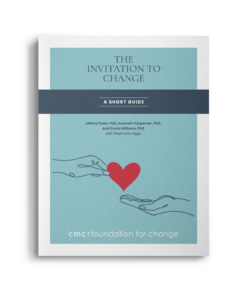At CMC, we have lots of family members call us to ask for advice about how to help someone they love who they think is struggling with a substance use problem. We get mom’s calling about their children, husbands calling about their wives, adult children calling about their parent. And one of the things we here from these folks is “everyone has given me so much advice, I really don’t know what to do”! They have often read articles and books. Have often gotten a wide range of advice or feedback from friends, other family members, therapists, and the media. And more often than not, they feel MORE confused about the best way to move forward rather than less.
Since we don’t want to add to the confusion, we usually start out by orienting them to the points below and we hope that if you are someone who feels confused about how to help someone you love, that these thoughts help ground you. Each one of these points are further discussed in the links provided below. We hope that you find the support you need and deserve as you try to find ways to help your loved one.
You can Help with Understanding: One Answer Does Not Fit All (link)
There is something important to remember when you find yourself swirling in strong emotions (like fear and maybe even anger) and other people’s opinions. You are likely one of the leading experts on your own loved one (whether it be your child or spouse/partner). It’s not likely that anyone who has given you advice (your therapist, a treatment provider, a book) has as much useful information about your loved one than you do. And that knowledge will be critical as you try to find a way to be helpful to them. It can be very easy to get caught up in the black and white advice of others or to start to believe it when people suggest there’s one best path towards change (e.g., “they just need to go to rehab”, or “they need to get off all their medications”) Having options, knowing that there are multiple pathways to change, and using your knowledge of your loved one will be powerful tools that can help you find your way. Please use them!
You can Help by Helping Yourself: Manage Your Emotions (link)
It’s likely that you are experiencing emotions like fear, and shame, and anger which are totally normal. Expressing these emotions however can make your goal of helping much more difficult. You end up crying or yelling in a conversation rather than being able to constructively talk things through with your loved one. It can help to anticipate when you are especially emotional and instead of engaging, let yourself step away. And in these moments, find a way to take care of yourself and soothe yourself so you can regroup and try again at a better time. Managing your emotions is crucially important in keeping the important conversations you want to have on track and moving forward.
You can Help with Words: Communicate With LOVE: Offering Information (link)
The good news about all the feedback you may have gotten from the people in your life is that you have a lot of information to sift through when you feel calm enough to do it. And instead of presenting your loved one with the “one” option, you may find that they are way more receptive to a “menu” of options. If there are several paths that seem to make at least some sense to you, offering your loved one a variety of ideas can engage him in thinking things through instead of just saying “no”. How you offer that information is also important and we suggest the “information sandwich” tool. The “sandwich” idea means checking in with your loved one before sharing the information, like simply asking, “can I share a couple of thoughts about some options?” Then provide the information (if he said yes!) and finally check back to see if those suggestions made sense to him. This last “checking back” part also includes giving him permission to disregard them if he wants. These are simple ways to have a back and forth with him that feels more collaborative and less pressured, making it more likely your loved one will actually be listening to you!
You can Help with Actions: Community Support (link)
And in this spirit of collaboration and support, look around in your life! You might have one or several really good supports and collaborators sitting right next to you: your siblings, a friend, a grown child. Yes, there will be some people in your life who have strongly different views that feel more exhausting to listen to than helpful. But for your sake, having support both emotionally and in terms of the direction you are trying to push can be crucial. This can take some work! Your sister might be in agreement with you when you try to think through ways to be helpful to your mother, but you notice yourselves getting on each others nerves anyway just because of the emotions around this whole situation. It’s really important, and really helpful for the long haul, to develop the support of people who actually care about the position you are in. They don’t have to be on your precise page, just similar enough to support you in tough emotional times.
A special note about 12-Step Programs
We wanted to make a note specifically about AA and advice people may give you about 12-Step involvement..for you (as in “you really need to get to some Alanon meetings”) or about your loved one (as in “if he’s not going to AA or NA he’s probably not serious”). Just like the rest of the advice and counsel you may be getting, this is well meaning and it really does work for some people. It tends to be given however, with a certain amount of conviction, kind of in a “everyone knows this is true” manner. This is a special category of black and white thinking that is quite prevalent in our culture because unfortunately that is mostly all people have ever heard about! The truth is back to where we started: you know your situation and family best of all, and around this particular advice, it remains true that different people need different paths. Some people and families are helped by 12 step involvement, many are not. Our advice? Try to understand what paths make sense and are doable for you and your loved one.




